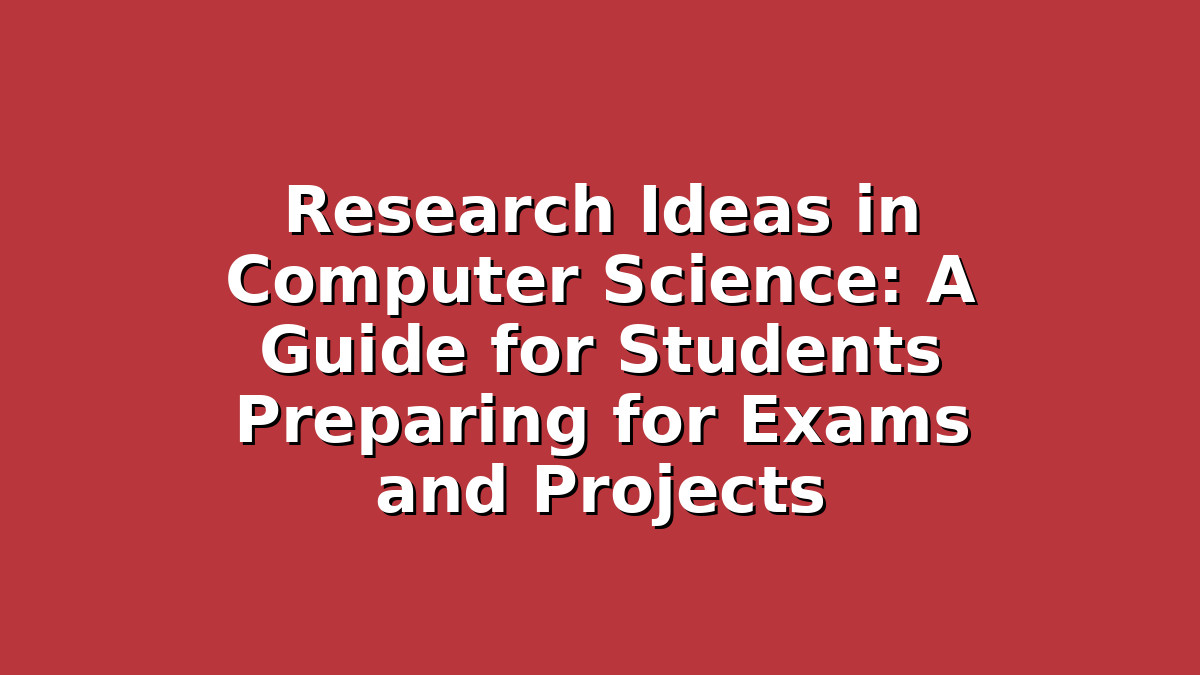Computer Science is a diverse and rapidly evolving field that offers endless opportunities for exploration and innovation. Whether you are a student preparing for exams, working on a project, or simply looking to deepen your understanding of the subject, identifying the right research ideas can make a significant difference in your learning journey. This article aims to guide you through some compelling research ideas in computer science, along with practical study tips to help you excel.
Introduction
Preparing for computer science exams or undertaking research projects can sometimes feel overwhelming. The sheer volume of topics and the fast-paced nature of technology may leave you unsure about where to focus your efforts. However, by choosing research topics that align with your interests and current trends, you can stay motivated and gain a deeper grasp of key concepts. In this blog, we will explore three research areas: Artificial Intelligence and Machine Learning, Cybersecurity, and Algorithms & Data Structures. Alongside, we will provide study strategies to help you manage your exam preparation effectively.
—
Section 1: Exploring Artificial Intelligence and Machine Learning
Artificial Intelligence (AI) and Machine Learning (ML) have become some of the most exciting and high-impact areas in computer science today. Research in AI can range from understanding neural networks to exploring natural language processing or computer vision.
Why Study AI and ML?
AI and ML are not just buzzwords; they are transforming industries from healthcare and finance to entertainment and transportation. For students, diving into these topics provides practical skills that are highly sought after in the job market. Additionally, many exam boards now include foundational AI concepts as part of their syllabi.
Research Ideas to Consider
– Developing a simple image recognition system using open-source datasets like MNIST or CIFAR-10.
– Exploring the ethical implications of AI decision-making in automated systems.
– Implementing a chatbot using natural language processing libraries.
– Comparative study of supervised vs unsupervised learning techniques.
Study Tips for AI and ML Topics
– Start with the basics: Understand linear algebra, probability, and statistics as they form the foundation of ML algorithms.
– Use visual aids: Conceptual diagrams and flowcharts can help clarify complex processes such as backpropagation in neural networks.
– Practice coding: Platforms like Kaggle and Google Colab offer free resources to implement ML models hands-on.
– Break down research papers: Summarize key points in your own words and discuss them with peers to deepen your understanding.
—
Section 2: Delving into Cybersecurity
As digital systems become more integral to everyday life, cybersecurity remains a critical area for research and study. For students, cybersecurity research not only prepares you for exams but also provides awareness of real-world challenges in protecting data and privacy.
Importance of Cybersecurity Research
Cyber attacks are increasing in frequency and sophistication, which makes understanding defensive strategies essential for any computer science student. Researching cybersecurity helps you develop problem-solving skills in areas such as cryptography, network security, and ethical hacking.
Research Ideas to Explore
– Analysis of common cyberattack vectors and how to mitigate them.
– Design and implementation of a basic firewall or intrusion detection system.
– Study of encryption algorithms and their applications in securing data.
– Exploring the role of blockchain technology in enhancing cybersecurity.
Study Advice for Cybersecurity Topics
– Stay updated: Cybersecurity evolves fast, so follow trusted blogs, news sites, and forums to keep abreast of recent developments.
– Hands-on practice: Use virtual labs and tools like Wireshark or Metasploit to simulate security scenarios.
– Understand protocols: Learn about TCP/IP, HTTPS, SSL/TLS to grasp how networks operate securely.
– Group discussions: Collaborate with classmates to brainstorm security solutions and conduct mock cyberattacks to test your knowledge.
—
Section 3: Mastering Algorithms and Data Structures
Algorithms and data structures form the backbone of computer science and are crucial for both exams and research projects. They offer a systematic way to solve problems efficiently and are widely used in software development, AI, and more.
Why Focus on Algorithms and Data Structures?
Proficiency in these topics not only boosts your problem-solving skills but also helps you perform well in technical interviews and competitive programming contests. Moreover, many exam questions focus heavily on algorithmic thinking.
Research Topics You Can Try
– Comparative analysis of sorting algorithms: time complexity and space complexity.
– Implementation and use-cases of advanced data structures like heaps, tries, and graphs.
– Study of algorithm optimization techniques such as dynamic programming and greedy algorithms.
– Research on parallel algorithms and their applications in high-performance computing.
Effective Study Techniques for Algorithms and Data Structures
– Visualize the algorithms: Use animation tools or draw step-by-step diagrams to see how data moves and changes.
– Solve problems daily: Websites like LeetCode, HackerRank, and CodeSignal offer a wide range of exercises.
– Write code by hand: This helps reinforce logic and prepare you for written exams.
– Teach others: Explaining algorithms to peers or through blog posts boosts your retention and understanding.
—
Conclusion
Selecting the right research ideas in computer science can greatly enhance your exam preparation and overall learning experience. Whether you choose to explore Artificial Intelligence and Machine Learning, delve into Cybersecurity, or master Algorithms and Data Structures, remember that consistent practice and curiosity are key. Use the study tips provided to structure your learning, stay motivated, and tackle complex topics confidently. With dedication and the right approach, you can transform challenging subjects into opportunities for growth and success.
Happy studying, and never hesitate to reach out to your instructors or peers when you need support. The world of computer science is vast and full of potential — your research journey is just beginning!

Responses